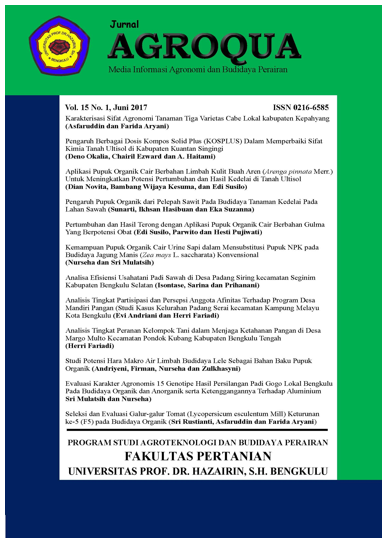PENGARUH DOSIS HERBISIDA BERBAHAN BAKU AIR KELAPA FERMENTASI TERHADAP GULMA DI PERKEBUNAN KELAPA SAWIT YANG BELUM MENGHASILKAN
DOI:
https://doi.org/10.32663/ja.v21i1.3918Keywords:
Axonopus compresus, fermented coconut water, oil palm plantationsAbstract
This study aims to determine the dosage of herbicides made from fermented coconut water against weeds in immature oil palm plantations. The research was conducted in March 2022, in Sukarami Village, Kedurang Ilir District, South Bengkulu Regency, Bengkulu Province. The experiment used a randomized block design with one factor, namely herbicide dose (D), consisting of 9 treatments: D1 = 10 L/ha, D2 = 15 L/ha, D3 = 20 L/ha , D4 = 25 L/ha, D5 = 30 L/ha, D6 = 35 L/ha, D7 = 40 L/ha, D8 = 45 L/ha, D9 = 50 L/ha. The results of the study concluded that smallholder oil palm plantations were dominated by Axonopus compresus (47.78%) and Ageratum conyzoides (30.98%). The weed that is resistant to this herbicide is Erigeron bonariensis L. The dose treatment has a significant effect on weeds in immature smallholder oil palm plantations. Treatment at a dose of 25 L/ha is effective in controlling weeds in immature oil palm plantations.
References
Downloads
Published
Issue
Section
License
Authors who publish with this journal agree to the following terms:
- Authors grant the journal right of first publication with the work simultaneously licensed under a Creative Commons Attribution 4.0 Internasional (CC BY 4.0) Licence that allows others to use and share the work with an acknowledgment of the work's authorship and initial publication in this journal.
- The author(s) still hold the copyright of his/her/their work and retain publishing rights without restrictions such as (but not limited to) patent right, lecture, book and reproduce the article for own purposes.
















